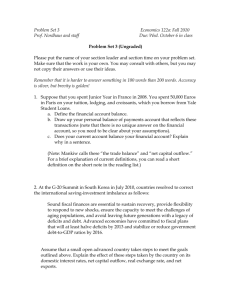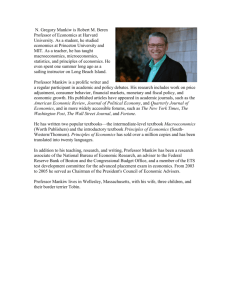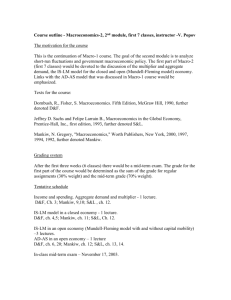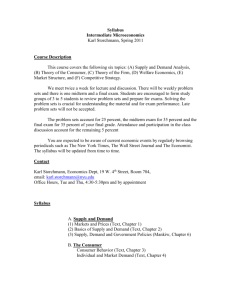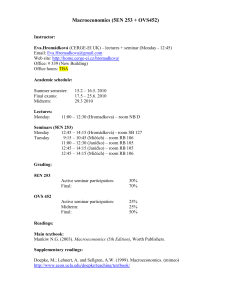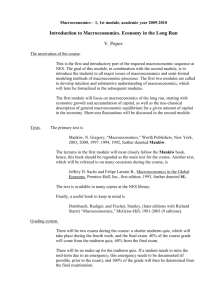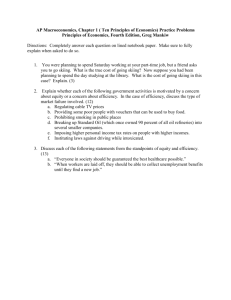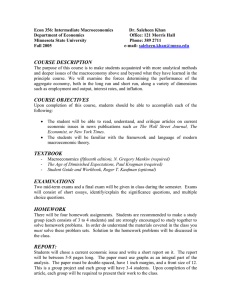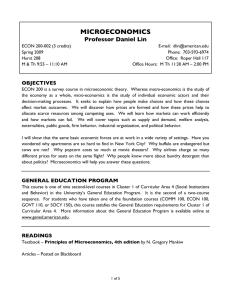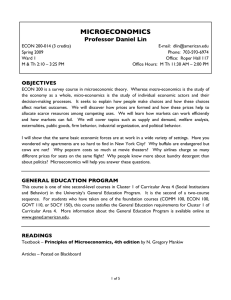AMERICAN UNIVERSITY DEPARTMENT OF ECONOMICS SYLLABUS 1
advertisement
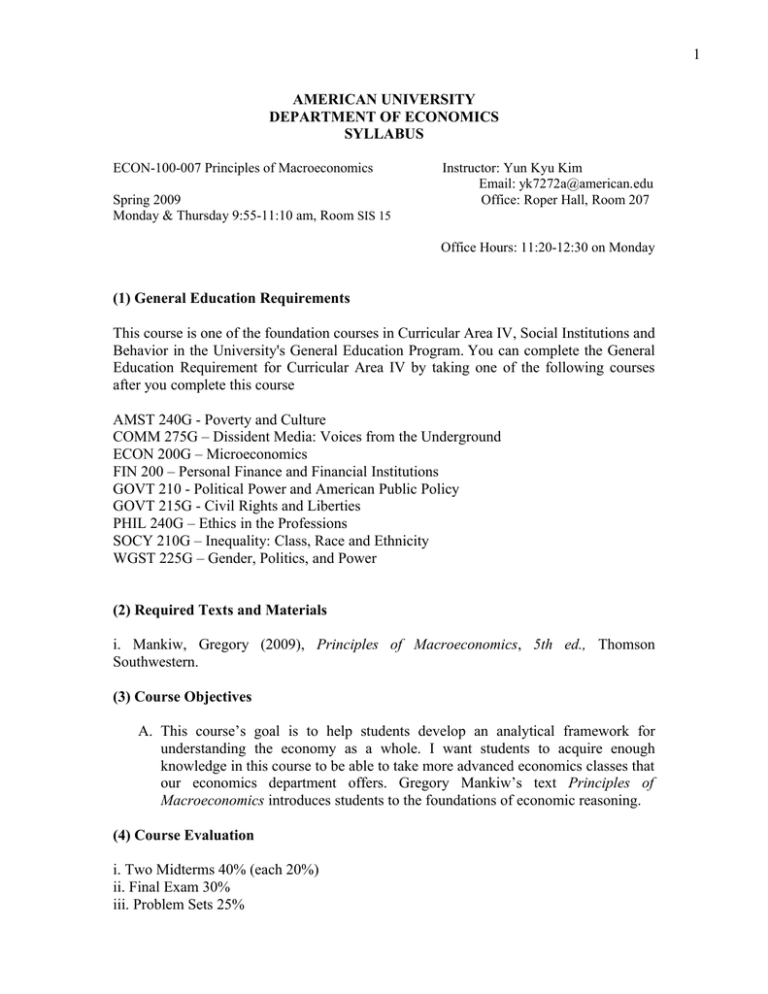
1 AMERICAN UNIVERSITY DEPARTMENT OF ECONOMICS SYLLABUS ECON-100-007 Principles of Macroeconomics Spring 2009 Monday & Thursday 9:55-11:10 am, Room SIS 15 Instructor: Yun Kyu Kim Email: yk7272a@american.edu Office: Roper Hall, Room 207 Office Hours: 11:20-12:30 on Monday (1) General Education Requirements This course is one of the foundation courses in Curricular Area IV, Social Institutions and Behavior in the University's General Education Program. You can complete the General Education Requirement for Curricular Area IV by taking one of the following courses after you complete this course AMST 240G - Poverty and Culture COMM 275G – Dissident Media: Voices from the Underground ECON 200G – Microeconomics FIN 200 – Personal Finance and Financial Institutions GOVT 210 - Political Power and American Public Policy GOVT 215G - Civil Rights and Liberties PHIL 240G – Ethics in the Professions SOCY 210G – Inequality: Class, Race and Ethnicity WGST 225G – Gender, Politics, and Power (2) Required Texts and Materials i. Mankiw, Gregory (2009), Principles of Macroeconomics, 5th ed., Thomson Southwestern. (3) Course Objectives A. This course’s goal is to help students develop an analytical framework for understanding the economy as a whole. I want students to acquire enough knowledge in this course to be able to take more advanced economics classes that our economics department offers. Gregory Mankiw’s text Principles of Macroeconomics introduces students to the foundations of economic reasoning. (4) Course Evaluation i. Two Midterms 40% (each 20%) ii. Final Exam 30% iii. Problem Sets 25% 2 v. Class participation 5% Total: 100% (5) Problem sets Weekly problem sets will be assigned each Thursday, and students need to turn in the assignment at the beginning of the following Thursday class. The solution of the problem set will be available each week. The purpose of the problem sets is to help you understand the class material in timely manner. It is very important that you do these every week. Please note that the problem set grade is a major part of your total grade. I strongly encourage you to work with other students, but you will need to write your own answers. You will also need to specify the fellow students with which you worked. (6) Academic Integrity Standards of academic conduct are set forth in the University’s Academic Integrity Code. By registering, you have acknowledged your awareness of the Academic Integrity Code. You should become familiar with your rights and responsibilities as defined by the Code. Violations of the Academic Integrity Code will not be treated lightly, and disciplinary actions will be taken should such violations occur. Please see me if you have any questions about the academic violations described in the Code in general or as they relate to particular requirements for this course. (8) Course outline and Schedule Please note that this course schedule is tentative and subject to change. January 12, 15, and 19: Introduction to the basic principles of economics and the economic way of thinking. Reading: Mankiw chapter 1, 2& 3 January 22, 26, 29 and February 2: Framework for understanding markets Reading: Mankiw chapter 4, 5, 6, 7 First Midterm: (take home) February 5; watch a documentary February 9 & 12: Basic measurements of macroeconomics Reading: Mankiw 10 & 11 February 16: Economic growth and development Reading: Mankiw 12 February 19 and 23: The real economy in the long run Reading: Mankiw 13, & 15 February 26, March 2, and 5: Introduction to monetary economics 3 Reading: Mankiw 16 & 17 Second Midterm (take home) Spring Break: March 8-15 March 16; watch a documentary March 19, 23, 26, 30, April 2, 6 and 9: Introduction to Business cycle Reading: Mankiw 20, 21 & 22 April 13, 16 and 2: Introduction to open macroeconomics Reading: Mankiw 18 & 19 April 23 and 27: The Basic Tools of finance Reading: Mankiw 14 Final Exam, April 30: 08:30am-11:00am Please note that the date and time of final Exam is strictly fixed.
